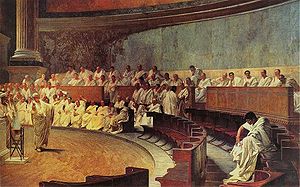Overview and History
Timeline of Ancient Rome
Early History of Rome
The Roman Republic
Republic to Empire
Wars and Battles
Roman Empire in England
Barbarians
Fall of Rome
Cities and Engineering
The City of Rome
City of Pompeii
The Colosseum
Roman Baths
Housing and Homes
Roman Engineering
Roman Numerals
|
Daily Life
Daily Life in Ancient Rome
Life in the City
Life in the Country
Food and Cooking
Clothing
Family Life
Slaves and Peasants
Plebeians and Patricians
Arts and Religion
Ancient Roman Art
Literature
Roman Mythology
Romulus and Remus
The Arena and Entertainment
|
People
Augustus
Julius Caesar
Cicero
Constantine the Great
Gaius Marius
Nero
Spartacus the Gladiator
Trajan
Emperors of the Roman Empire
Women of Rome
Other
Legacy of Rome
The Roman Senate
Roman Law
Roman Army
Glossary and Terms
|
